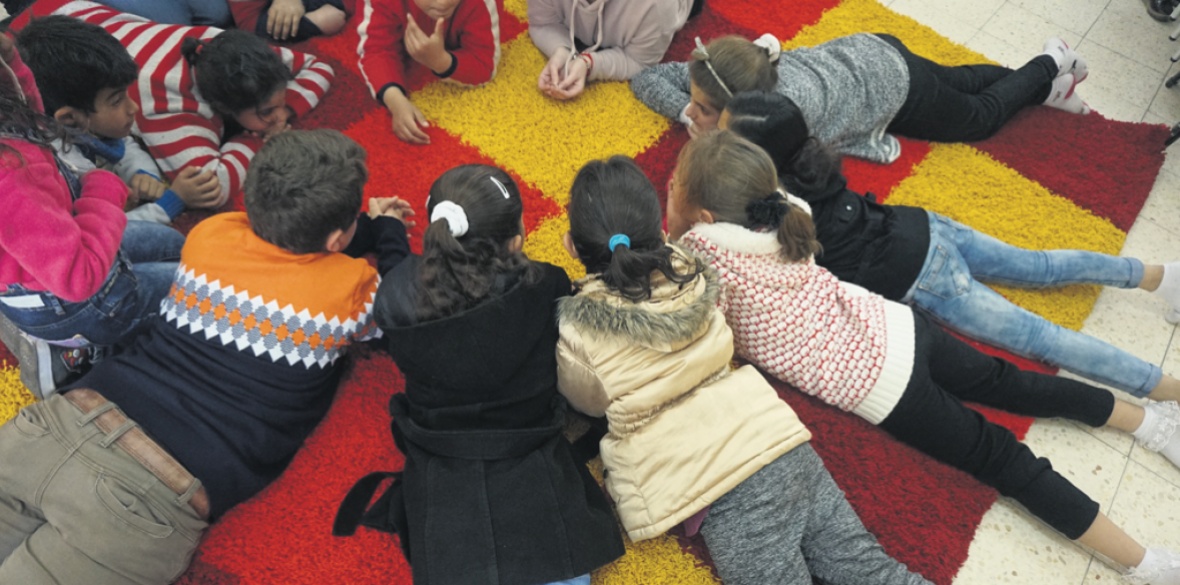This is the last article you can read this month
You can read more article this month
You can read more articles this month
Sorry your limit is up for this month
Reset on:
Please help support the Morning Star by subscribing here
FOUR years ago, Fergal Doherty, secretary of the steering group and a principal psychologist with Glasgow City Council, watched as men in uniform used tear gas, skunk water, rubber bullets and live rounds on peaceful demonstrations of children and young people.
As the clouds of choking gas cleared, Doherty watched these men retreat behind a 20-foot concrete wall that encircled the town.
This was Bethlehem just days before Christmas. But for the children of Palestine there was nothing special about the time of year — it was just another day in what passed for life under Israeli occupation.
The occupation of the West Bank since 1967 has had profound impact on Palestinians, but children are its real “collateral damage,” and for decades the children of Palestine have known no other life.
Research from mental health workers in the occupied territories has shown that a third of all children between the ages of 10 and 19 suffer from mental health issues such as post-traumatic stress, with hyperactivity, low self-esteem and depression all commonplace.
The World Health Organisation has also recorded mental distress, depression and anxiety in a third to half of all people living in the occupied West Bank.
For the steering group members, this snapshot of daily life in Palestine that day had echoes of their own work with children in Glasgow whose young lives have been curtailed.
They wondered whether their own experience with these children, coping with the trauma caused by poverty and neglect — and associated problems of addictions and domestic violence — could help the children of Palestine.
But also, and more intriguingly, what could they as mental health workers here learn from a collaboration with colleagues in Palestine ie The Guidance and Training Centre (GCT) for Children and Families in Bethlehem?
Thus the project, and its steering group, was born.
Running for four years now, it comprises colleagues in the fields of educational, clinical and forensic psychology, speech and language therapy — in Glasgow City Council and NHS Greater Glasgow and Clyde (NHSGGC) — as well as academic partners at Glasgow and Dundee Universities. All working closely with colleagues from the GTC and others in Palestine.
For steering group members on their visits even simple things like attending meetings or visiting families consumed hours of time and organisation. They were regularly stopped for papers at checkpoints and then had to navigate the segregated road system encircling Bethlehem to avoid the Israeli settlements protected by the wall running through and round the town.
Travelling to meetings and events was made difficult, and the steering group had a small taste of life for Palestinians under occupation.
But what impressed members of the steering group, and the practitioners who have visited, the most has been the spirit and resilience of the Palestinians.
Despite the scale of the mental health problems, Palestinian life is still rooted in their culture and family life.
“Family life is a strong resilience factor in combatting mental health in children. It might seem obvious, but we have seen first-hand just how strong a factor it can be dealing with the stress and anxiety of life under occupation.
“It’s a lesson we need to take back home in our work where poverty, neglect and trauma has broken and fractured family life here,” said Stephen McLeod, chair of the steering group and head of specialist children’s services in NHSGGC.
For their Palestinian counterparts, “The aim is to share knowledge and clinical practice, to develop the skills of the team based here in Bethlehem and to increase the numbers of highly qualified clinicians working locally with children and their families.
“The programme also allows for two-way exchange visits of psychologists, psychiatrists and speech therapists and others to build this post-graduate training” said Dr Caesar Hakim, the clinical director at the GTC.
And that last point pretty much sums up the work of the Scottish initiative out there. It is a strong evidence-based approach, combining key elements of educational and clinical psychology, but one that is practical and doable at the same time.
A recent launch seminar in Bethlehem in June 2018 was attended by the Ministries of Health, Education, Higher Education and Social Care of the Palestinian Authority and involving over 100 practitioners from the field in Palestine
However, Dr Nael Abdelrahman, chair of the GTC board, stated: “The collaboration is still in its infancy, but there is no lack of optimism among us here in Palestine, and our Scottish colleagues, now friends … We are co-producing something unique in Palestine and Scotland!”
As GTC administrative director Fadia Salah said: “The road to recovery for Palestine’s children will be a long one, but, with the support from our colleagues in Scotland, we can build on the work being done on the ground among our own health workers in Bethlehem and the West Bank.
“One day the occupation will be over and it will be the children of Gaza and the West Bank who will have to rebuild a new Palestine.”
Glasgow Lord Provost Cllr Eva Bolander said: “We are honoured to be part of the twinning projects focusing on our projects on health and well-being.
“Their purpose is to strengthen the bonds between our peoples, encourage greater co-operation, deepen understanding and foster the improved health and wellbeing of our citizens.
“I’m proud, in this spirit of friendship and international co-operation to work with Bethlehem and lend our support to these vital projects that demonstrate so well, the value of twinning relationships.”











